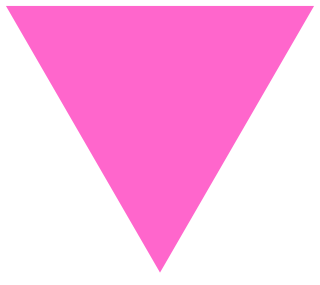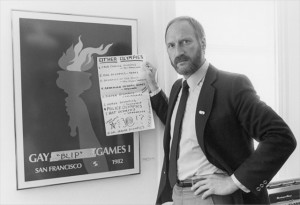
A gay village, also known as a gayborhood or gaybourhood, is a geographical area with generally recognized boundaries that is inhabited or frequented by many lesbian, gay, bisexual, transgender, and queer (LGBTQ) people. Gay villages often contain a number of gay-oriented establishments, such as gay bars and pubs, nightclubs, bathhouses, restaurants, boutiques, and bookstores.

A pink triangle has been a symbol for the LGBT community, initially intended as a badge of shame, but later reappropriated as a positive symbol of self-identity. In Nazi Germany in the 1930s and 1940s, it began as one of the Nazi concentration camp badges, distinguishing those imprisoned because they had been identified by authorities as gay men or trans women. In the 1970s, it was revived as a symbol of protest against homophobia, and has since been adopted by the larger LGBT community as a popular symbol of LGBT pride and the LGBT movements and queer liberation movements.

Dorothy Louise Taliaferro "Del" Martin and Phyllis Ann Lyon were an American lesbian couple based in San Francisco who were known as feminist and gay-rights activists.

Tom Waddell was an American physician and decathlete who competed at the 1968 Summer Olympics, and founder of the Gay Olympics.

Lakeview is one of the 77 community areas of Chicago, Illinois. Lakeview is located on the city's North Side and is bordered by West Diversey Parkway on the south, West Irving Park Road on the north, North Ravenswood Avenue on the west, and the shore of Lake Michigan on the east. The Uptown community area is to Lakeview's north, Lincoln Square to its northwest, North Center to its west, and Lincoln Park to its south. The 2020 population of Lakeview was 103,050 residents, making it the second-largest Chicago community area by population.
PFLAG is an LGBT advocacy organization founded and led by friends and family of LGBT people. PFLAG is a national organization presiding over decentralized local and regional chapters. PFLAG has nearly 400 chapters across the United States, with more than 350,000 members and supporters.

Center on Halsted is a lesbian, gay, bisexual, and transgender (LGBTQ) community center in Chicago, Illinois.

Technical Sergeant Leonard Phillip Matlovich was an American Vietnam War veteran, race relations instructor, and recipient of the Purple Heart and the Bronze Star. He was the first gay service member to purposely out himself to the military to fight their ban on gays, and perhaps the best-known openly gay man in the United States of America in the 1970s next to Harvey Milk. His fight to stay in the United States Air Force after coming out of the closet became a cause célèbre around which the gay community rallied. His case resulted in articles in newspapers and magazines throughout the country, numerous television interviews, and a television movie on NBC. His photograph appeared on the cover of the September 8, 1975, issue of Time magazine, making him a symbol for thousands of gay and lesbian servicemembers and gay people generally. Matlovich was the first named openly gay person to appear on the cover of a U.S. newsmagazine. According to author Randy Shilts, "It marked the first time the young gay movement had made the cover of a major newsweekly. To a movement still struggling for legitimacy, the event was a major turning point."

The Chicago Pride Parade, also colloquially called the Chicago Gay Pride Parade or PRIDE Chicago, is an annual pride parade held on the last Sunday of June in Chicago, Illinois in the United States. It is considered a culmination of the larger Gay and Lesbian Pride Month in Chicago, as promulgated by the Chicago City Council and Mayor of Chicago. Chicago's Pride Parade is one of the largest by attendance in the world. The event takes place outside and celebrates equal rights for lesbian, gay, bisexual, transgender and queer people, which is also known as the celebration of LGBTQ rights.

Vito Russo was an American LGBT activist, film historian, and author. He is best remembered as the author of the book The Celluloid Closet, described in The New York Times as "an essential reference book" on homosexuality in the US film industry. In 1985, he co-founded the Gay and Lesbian Alliance Against Defamation (GLAAD), a media watchdog organization that strives to end anti-LGBT rhetoric, and advocates for LGBT inclusion in popular media.

The Gerber/Hart Library and Archives, founded in 1981, is the largest circulating library of gay and lesbian titles in the Midwestern United States. Located in Chicago's Rogers Park neighborhood, it houses over 14,000 volumes, 800 periodical titles, and 100 items in the archival collection. The Gerber/Hart Library and Archives were inducted into the Chicago Gay and Lesbian Hall of Fame in 1996.
Howard Brown Health is a nonprofit LGBTQ healthcare and social services provider that was founded in 1974. It is based in Chicago and was named after Howard Junior Brown.

The Chicago LGBT Hall of Fame is an institution founded in 1991 to honor persons and entities who have made significant contributions to the quality of life or well-being of the LGBT community in Chicago. It is the first city-sponsored hall of fame dedicated to LGBT people, organizations and community in the United States.

Lucy Foozie, better known as simply Miss Foozie, is a character from Chicago. Time Out Chicago calls her a "drag hostess and entertainer", and Chicago Free Press has awarded her "best female impersonator". Since 2008, Miss Foozie has served as Community Ambassador for ChicagoPride.com.
The U.S. state of Illinois has an active LGBT history, centered on its largest city Chicago, where by the 1920s a gay village had emerged in the Old Town district. Chicago was also the base for the short-lived Society for Human Rights, an early LGBT rights advocacy organization (1924). In 1961 Illinois became the first U.S. state to decriminalize certain forms of homosexual activity. Gay and lesbian culture developed in Chicago thereafter, and the 2006 Gay Games were held in the city. Civil unions have been recognized in Illinois since 2014.
The LGBTQ community in Chicago is one of the United States' most prominent, especially within the Midwest, alongside those of San Francisco and New York City, and holds a significant role in the progression of gay rights in the country. With a population of around 3 million, Chicago is the third biggest city in the US, and around 150,000 of those people identify as lesbian, bisexual, gay, transgender, questioning, or other.
Artemis Singers is an American lesbian feminist chorus based in Chicago, Illinois. Its goals are to create positive change in cultural attitudes toward women and female artists and to "increase the visibility of lesbian feminists."
The Rainbow Honor Walk (RHW) is a walk of fame installation in San Francisco, California to honor notable lesbian, gay, bisexual, transgender, and queer (LGBTQ) individuals from around the world "who left a lasting mark on society." Its bronze plaques honor LGBTQ individuals who "made significant contributions in their fields". The plaques mark a walk located within the business district of the Castro neighborhood, which for decades has been the city's center of LGBTQ activism and culture.
The rainbow plaque programme is a UK scheme to create commemorative plaques to highlight significant people, places and moments in LGBTQIA+ history. Emulating established UK blue plaque programmes run by English Heritage, local authorities and other bodies, the first permanent rainbow plaque was unveiled in York in July 2018. Some UK LGBT locations are denoted by pink plaques, an idea that predated rainbow plaques.












